'A big human guinea pig experiment': Marijuana is illegal, but its chemical cousin delta-8 is already here — and making some sick
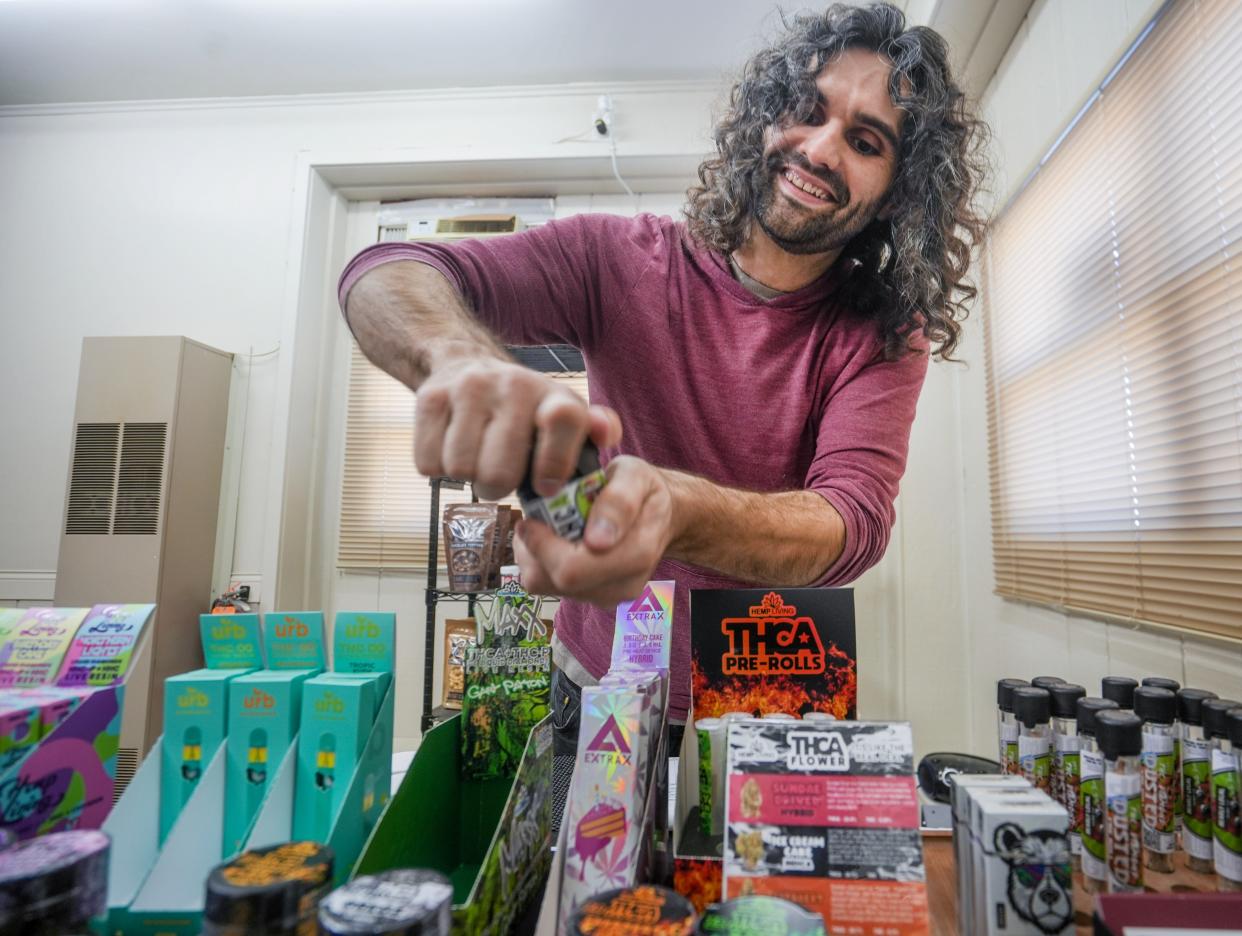
This story is published as part of the series Highly Legal in partnership with The Examination, a nonprofit newsroom that investigates global health threats, and AL.com, PennLive and USA TODAY. Our team is continuing to report on new cannabis products and we want to hear from you. Share your experience or questions with us here.
For the past decade, as Wisconsin’s neighbors have legalized marijuana one by one, the debate about pot has raged in Madison without resolution.
But here’s the reality: Something very much like it is already here.
A blizzard of gummies, vapes and smokable buds that deliver the same high as marijuana products sold in Illinois or Michigan have popped up in Wisconsin, at gas stations, strip mall dispensaries and even tourist shops.
Instead of driving across the state line to buy marijuana, Wisconsinites need only drive down the street.
An investigation by the Milwaukee Journal Sentinel, The Examination and AL.com found that these chemical cousins to marijuana — with names like delta-8, HHC and THCH — are causing a sharp rise in reports of children and adults getting sick, alarming doctors and public health researchers.
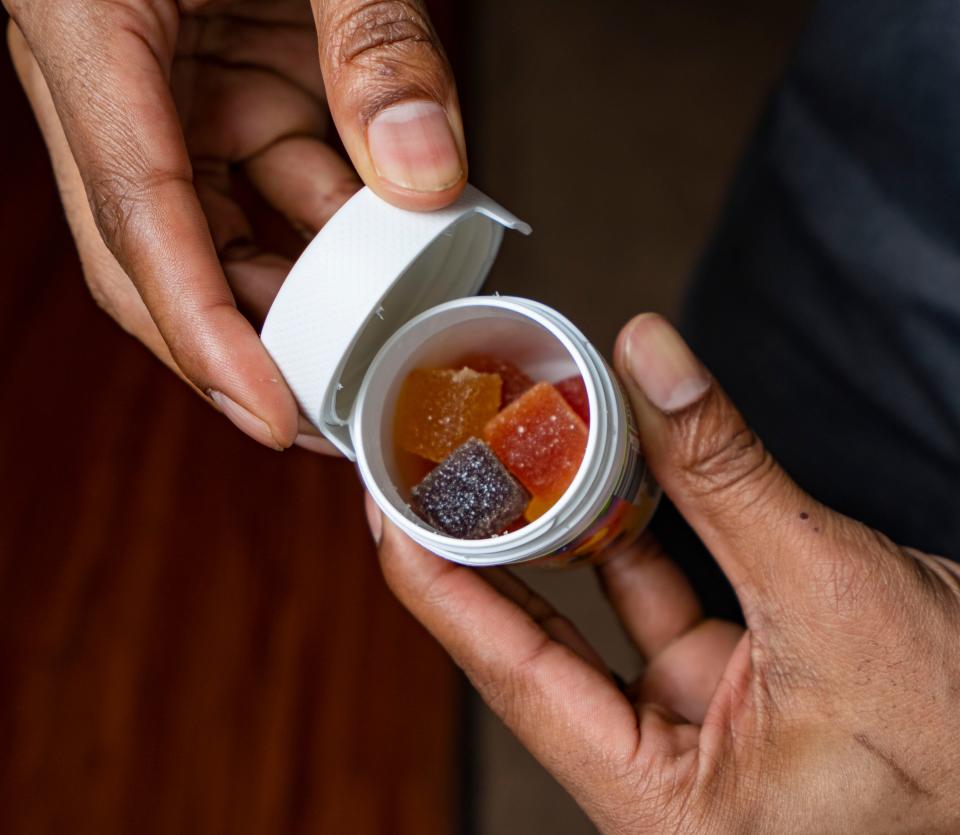
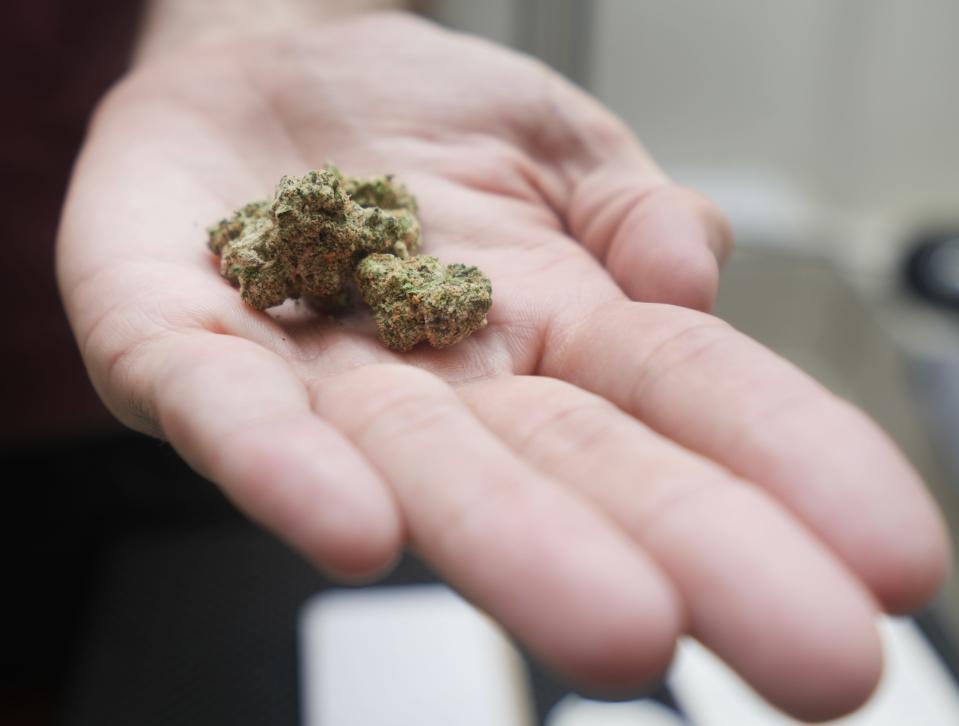
But as other states crack down on this fast-emerging, unregulated breed of cannabis product, there is no evidence of urgency in Madison. The same lawmakers who could not even agree on a highly restrictive medical marijuana proposal earlier this year have made no moves to rein in an essentially identical product.
“It’s a big human guinea pig experiment with a lot of these substances. And that, of course, in and of itself, should be alarming,” said Patrick Cournoyer of the U.S. Food and Drug Administration, which has fielded more than 100 complaints about delta-8.
The emergence of delta-8 and similar products can be traced to the 2018 Farm Bill, when Congress legalized the sale of hemp and products extracted from it. Hemp is a variety of the cannabis plant that has low levels of delta-9 THC, the psychoactive compound that gets people high.
Through processing, manufacturers have found ways to extract highly potent compounds from hemp. As of last year, the fledgling industry had grown to nearly $3 billion in annual sales, fueled by online and in-person purchases.
Jonathan Miller, of the trade group U.S. Hemp Roundtable, said many people are grateful for the products, using them to reduce anxiety, relieve pain, or sleep.
But even Miller said the FDA should do more to regulate the industry.
“Many hemp companies use good manufacturing practices that promote safe products,” said Miller. “Some bad apples don’t.”
Phil Watts, of Milwaukee, said he uses delta-8 and similar products to help him relax, especially after long days working as a computer network engineer or following his tough gym workouts.
“It doesn’t get me delusional,” Watts, 46, said of his combination of delta-8 and CBD. “It’s just smooth … My body and my mind are relaxed.”
The first couple of times Watts bought delta-8, it was from gas stations. He said it had an off-taste and didn’t do much. And the clerk didn’t know anything about the products. Watts now buys from a CBD store with knowledgeable staff.
He would prefer to use actual marijuana, but unless it becomes legal in Wisconsin, he will continue to settle for delta-8.
Other consumers have suffered uncomfortable highs, and in some circumstances, panic attacks, psychosis and hospitalization.
In 2022, Jessica Watkins of Arlington, Texas, ate half of a delta-8 gummy to ease anxiety about a family visit. She soon regretted her decision. During the visit, she found herself cold, numb and shaking.
“It felt like my mental perception was really altered,” Watkins said. “It was the most frightening thing ever.”
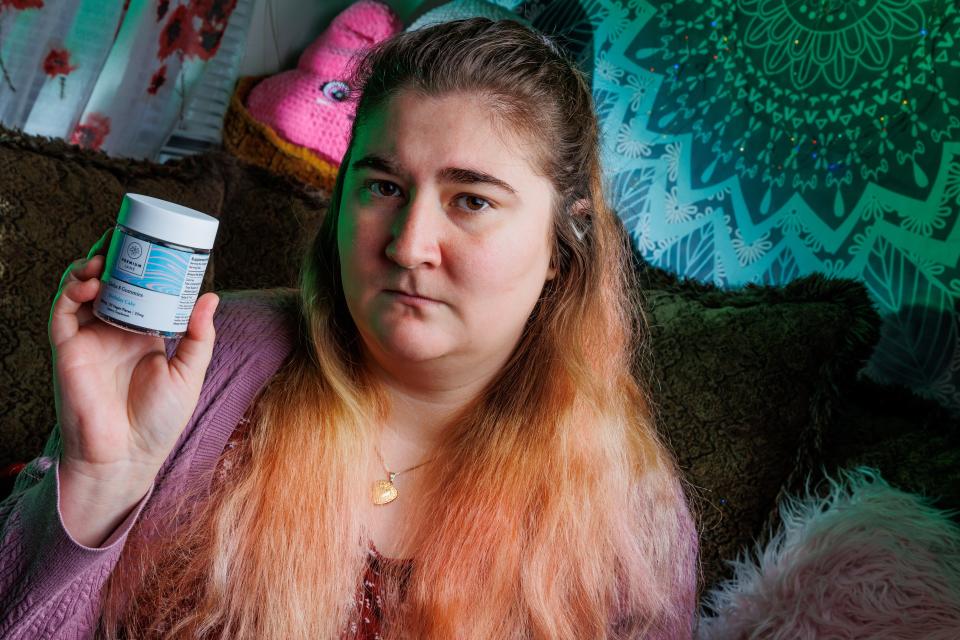
Those who are supposed to protect the public are confused, silent
More than a dozen states have moved to control or ban delta-8 and similar products. In Illinois, lawmakers introduced a proposal to outlaw delta-8 last week.
There's been no such action in Wisconsin.
No bills have passed — or even been proposed, according to the state Legislative Reference Bureau. A state consumer protection agency was licensing hemp-related companies, but it handed off that job to the U.S. Department of Agriculture two years ago.
There is no minimum age to buy the products here. Some shops require buyers to be 21. For others, it is 18.
There are no special taxes on these products, as there are on cigarettes or alcohol — or in some states, legal marijuana. The new intoxicants are taxed like a pack of gum.
In March, a bipartisan group of attorneys general from 21 states wrote to Congress urging action, saying the Farm Bill has unleashed “a flood of products that are nothing less than a more potent form of cannabis … with staggering levels of potency, no regulation, no oversight and a limited capability for our offices to rein them in.”
Wisconsin Attorney General Josh Kaul did not sign the letter. His office did not respond to requests from the Journal Sentinel for interviews on his position on the new products.
As the wildcat industry has flourished, Wood County in north central Wisconsin, population 74,000, was the first local government in the state to act, setting an age limit of 21 two years ago.
In 2022, the local health department learned that delta-8 and similar products were being sold next to candy in gas stations. Volunteer investigators found a Nerds candy rope had been removed from its original packaging, sprayed with delta-8, returned to the original package, and labeled as having delta-8.
The intoxicating candies and vapes were showing up regularly in high schools in Wood County, administrators reported.
New data reveals that is part of a larger trend. In a survey of more than 2,000 high school students by the National Institutes of Health released in March, 11% said they had used delta-8 in the last 12 months.
U.S. poison control centers logged more than 8,000 calls related to delta-8 and similar products from 2021 to 2023. Close to one-third involved children younger than six.
In Wisconsin last year, there were 145 reports of people being sickened by the products, 47 of them children under the age of 12, according to the Wisconsin Poison Center.
“Really everyone needs to know what the potential risks can be because this is a new reality,” said Ryan Feldman, a professor at the Medical College of Wisconsin’s School of Pharmacy. “If people do have this in their homes, they need to recognize it's not an innocuous substance.”
The children Feldman has seen brought into Children’s Hospital of Wisconsin after ingesting delta-8 are so sedated they look like they are on opioids, unable even to keep their heads up.

“They're acting unusual. Their heart rate is elevated. You know they're not able to answer questions appropriately,” he said. “That's a very scary set of symptoms in someone who's otherwise healthy.”
There have been a small number of deaths potentially linked to delta-8. According to a study published last January, the FDA collected reports of 22 deaths nationally between 2018 and 2021 where delta-8 was present. In four of the deaths, delta-8 was the only substance found, the study said.
In 2022, a 4-year-old Virginia boy died after eating a large number of delta-8 gummies. The cause of death was ruled lethal toxicity from delta-8.
Drug case against Waukesha CBD store illustrates legal gray area
A Waukesha County criminal case illustrates the murkiness of Wisconsin's law.
In late 2020, a woman from Hartford went to SuperStar Buds in Menomonee Falls to buy CBD oil. She said the owner, Christopher Syrrakos, gave her a free package of what looked like Sour Patch Kids candy. She put the gummies in her purse and forgot about them, according to a criminal complaint.
That night, her two young children went in her purse and ate the candy. The mother and her husband took their children to a local hospital. They were later transported to Children’s Hospital.
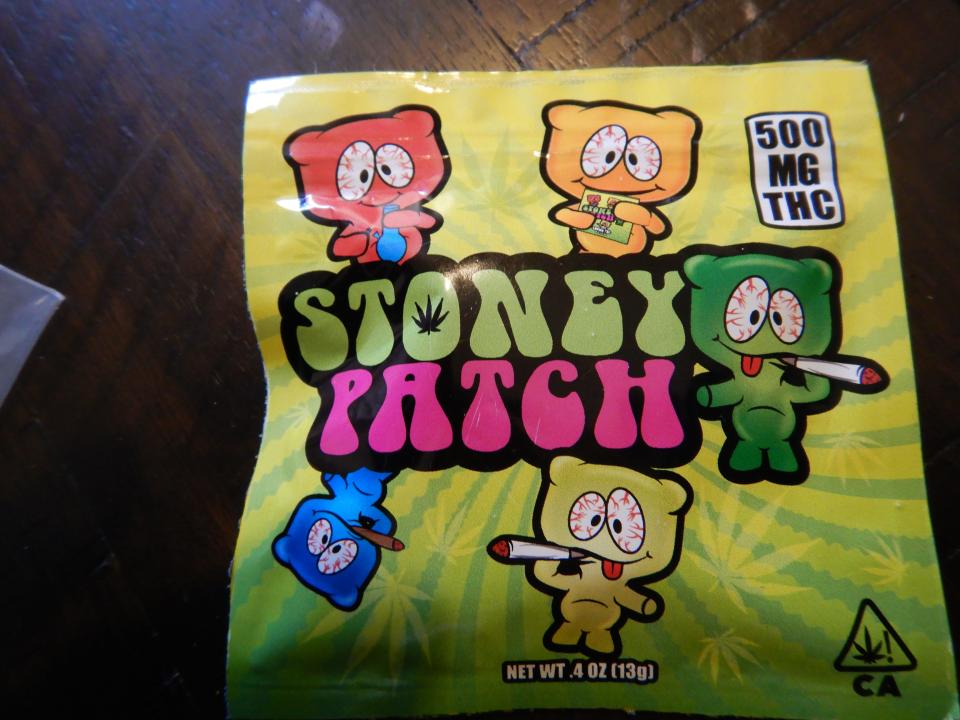
The police later learned the gummies had 500 milligrams of THC in them — five times the legal amount for edibles in most states with recreational marijuana.
An investigation was launched, with undercover officers going into Syrrakos’ store to buy delta-8 and other products. Testing found that many of the products contained between 20% and 40% THC — several hundred times more than the 0.3% limit allowed under the hemp law.
Syrrakos was charged with manufacturing THC, possession with intent to deliver THC and maintaining a drug trafficking place. His wife, Kristyn Shattuck, was charged with maintaining a drug trafficking place.
According to the complaint, Syrrakos told police he started selling CBD but switched to stronger products because of slow sales.
“I’m not the only one,” he told detectives. “I’m not gonna say that I’m the straightest and narrow character in the world, but there are some shitty people in it. I’m not gonna lie, there is THC. It’s damn near somewhat of a legal drug business, but an illegal drug business at the same time."
Paul Bucher, attorney for both Syrrakos and Shattuck, said when he got the case he knew nothing about hemp laws. After reviewing them, Bucher said the state Legislature should provide clear guidance on the issue, for regulatory oversight and for law enforcement.
“There is mass confusion. This is a Pandora’s Box that has been opened,” Bucher said. “I think someone is going to have to grab the bull by the horns and do something here.”
The case against Syrrakos was dismissed in February by Waukesha County Circuit Judge William Domina, who agreed with Bucher’s argument that the charges were referred incorrectly. The Waukesha County District Attorney’s Office is appealing.
Bucher said he expects the case to go to the state Supreme Court and may set a legal precedent.
“This thing is not dead,” he said.
Some look to delta-8 as an alternative to prescriptions, despite the risks
Jennifer Robinson opened a CBD American Shaman store in Menomonee Falls in 2019 with her husband.
Today, Robinson estimates about one-third of her customers are using the products for the recreational buzz. The rest come for products to help with their health, though she is careful to note the products make no medical claims.
“They are trying to get off prescriptions that have side effects, looking for an alternative. A lot of people are looking for help sleeping,” she said.
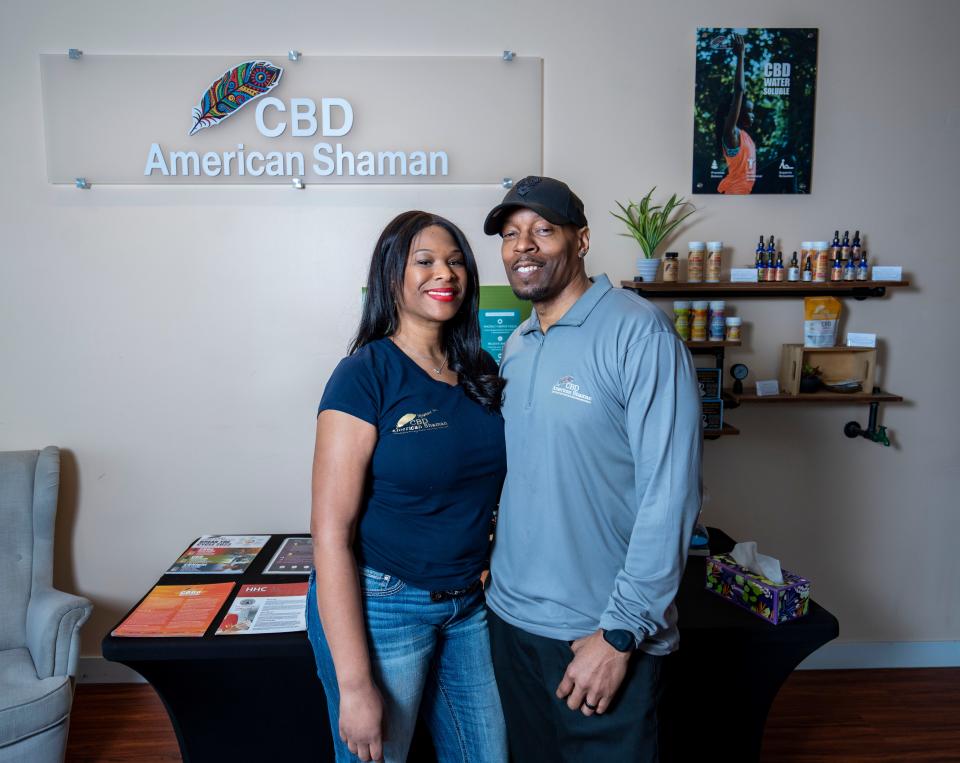
Robinson said government oversight would be useful, helping to distinguish specialty shops like hers from gas stations and convenience stores that don’t have knowledgeable staff. She said she and her husband are careful about what they carry, relying on their network of American Shaman distributors.
“We want to make sure we educate our customers so they know what they are getting,” she said. “Safety is our top priority.”
But quality can be uneven when products like delta-8 are being made anywhere from a lab-like facility to a seller’s basement.
Starting with low-THC hemp, which is legal under the Farm Bill, manufacturers use acids to extract delta-8 and similar compounds from the plant. The resulting high-THC solution is added to gummies and other products, and is supposed to be diluted by other ingredients so that the final product contains less than 0.3% THC. But there is no verification that companies' dosing claims are accurate.
Regulators and scientists have raised concerns about possible contamination or adulteration of hemp-derived products due to the synthetic processing and lack of regulatory requirements.
In states like New York, legal cannabis products must carry a certificate of analysis, a document that shows the product has been tested for heavy metals and pesticides. Hemp-derived products face no such requirement. When certificates are voluntarily provided, they can’t always be trusted.
Chris Hudalla, president and chief scientific officer of ProVerde Laboratories in Massachusetts, has tested thousands of hemp products. He found that many contain unknown byproducts, which he blames on how they’re made.
“We typically see somewhere between seven and 30 different chemical compounds that do not exist in nature. These are novel chemical compounds that are made accidentally during the process of the synthesis,” Hudalla said.
And the long-term effects of consuming these compounds remain unknown, he added. “If they cause cancer, we don’t know. If they cause birth defects (we don’t know.) These have not been studied in rats or mice. We don’t have names for them.”
Inconsistent potency is another issue. A testing lab at Virginia Commonwealth University found that some products on the market contained up to 10 times more delta-8 than what the package claimed.
“That’s extremely common because the unregulated market doesn’t really know how much of their active ingredient they should put into their product,” said Adie Rae Wilson Poe, a neuroscientist at Legacy Research Institute in Oregon. “And so what do they do? They make them stronger.”
Cannabinoid-induced psychosis symptoms such as hallucinations, delusions, intense fear, anxiety and paranoia are common, she said. If inhaled, the hemp products can break down into a highly toxic gas called Ketene, which can cause lung inflammation and lead to illnesses like pneumonia and bronchitis, Poe said.
Because the compound in delta-8 is structurally similar to traditional marijuana, it is possible to trigger a positive on a drug test. That could have serious implications, particularly in states where cannabis is illegal.
‘Federally compliant marijuana’
As states and the nation grapple with how to monitor hemp products like delta-8, new compounds are popping up, and with them new reports of unwanted highs and scary experiences.
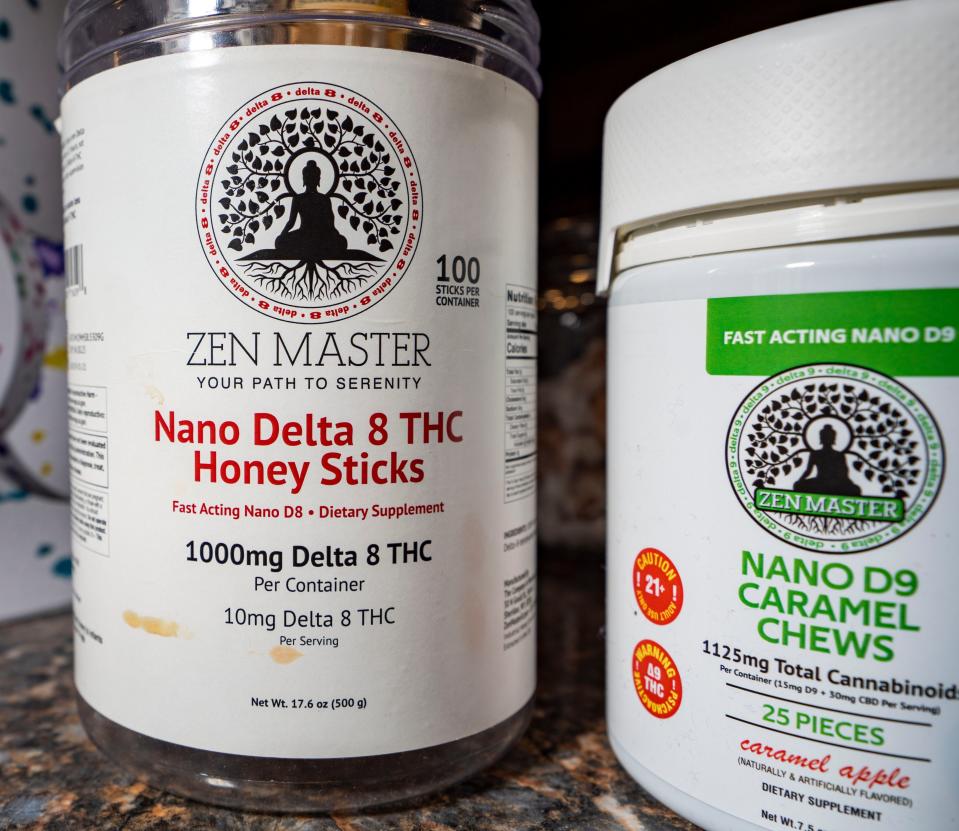
Many are completely synthetic and even more psychoactive than delta-8, experts say. These include products containing compounds called HHC, THCJD, and THCB. Even “hemp-derived delta-9” products are now widely available for sale — some contain even more THC than would be allowed in legal marijuana states.
Health agencies are already beginning to collect reports of harm from these newer compounds. In 2021, 100% of hemp-related exposures reported to U.S. poison control centers were delta-8 related. By October last year, that percentage fell to about 80%.
Darren Brook opened his store, Barge Cannabis, in West Bend in 2021, selling mostly CBD and then delta-8 products.
He shifted to more potent products and now is selling mostly THCA. It is grown in such a way as to test at the allowable federal limit of less than 1% THC, but converts to high-potency THC marijuana when burned.
Brook advertises it as “federally compliant marijuana” at his store, where the age to buy is 18.
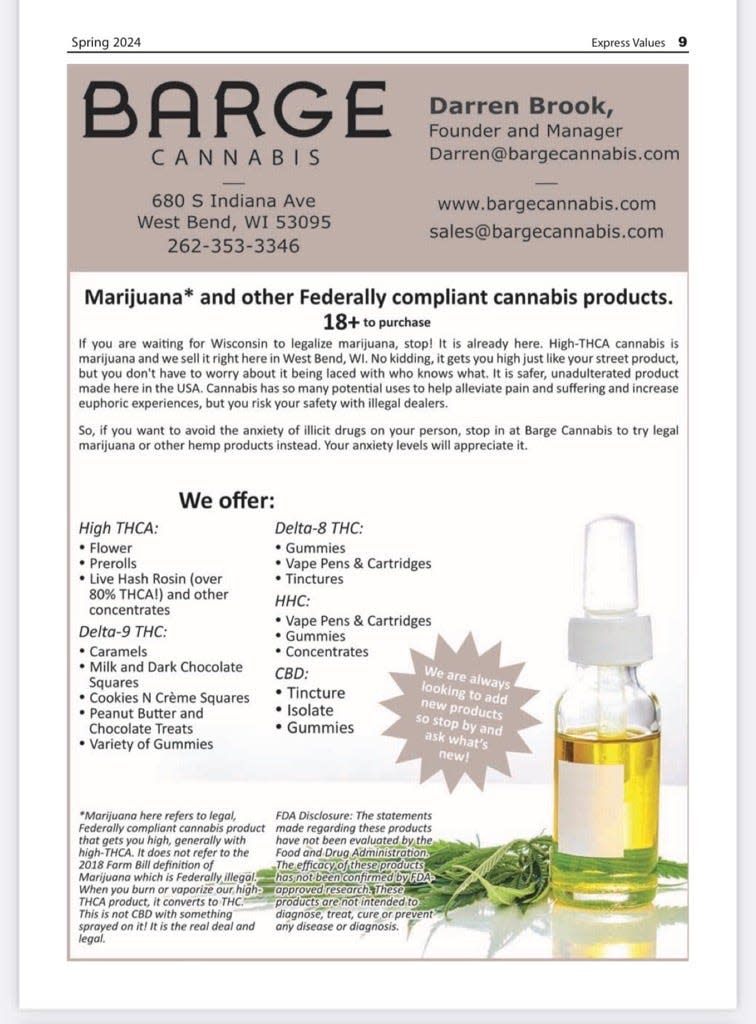
Brook wishes there was government testing of hemp-derived products to help with quality control. For now, Brook says he does his own product testing by smoking or vaping the products himself. Since he has asthma, he figures if the product burns his lungs, he shouldn't sell it.
“I basically use my own lungs as a litmus test,” he said.
Last year, Brook was testing a product advertised as being of superior quality. As he lit it, he said there was "an unmistakable solvent flavor, like when you walk into a bathroom and someone had been cleaning and you could just taste it. Not something you ever want to taste in cannabis. So yes, I have had bad experiences."
As Brook looks around his store, he concedes it is confusing how the federal law has been applied — and how he can run such an operation with seemingly no rules.
"As far as I know, there are no oversights," he said. "Everyone is calling it the Wild West."
John Diedrich is an investigative reporter with the Milwaukee Journal Sentinel. He can be reached at [email protected].
Ashley Okwuosa is a reporter at The Examination on the public health beat. She can be reached at [email protected].
Amy Yurkanin is a senior reporter at Al.com covering health care and women’s issues. She can be reached at [email protected].
This article originally appeared on Milwaukee Journal Sentinel: Untested delta-8, delta-9, HHC alarms Wisconsin doctors, researchers
